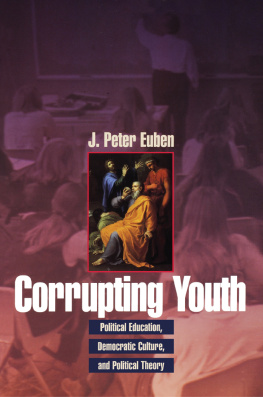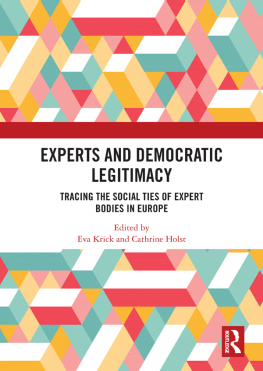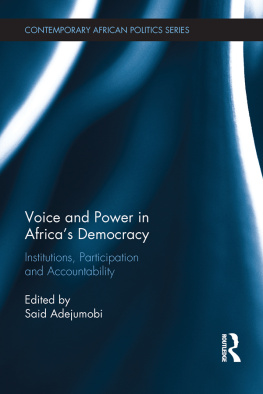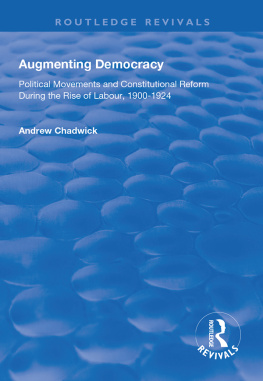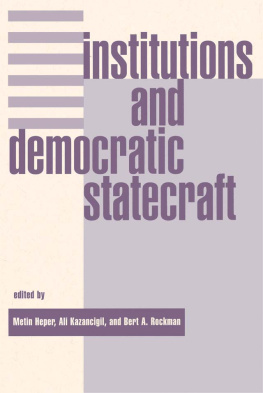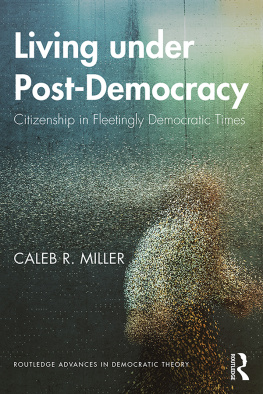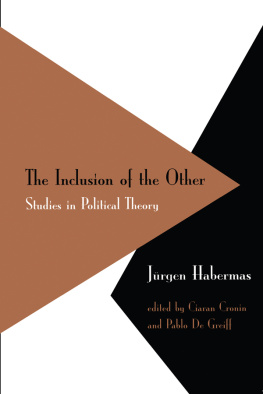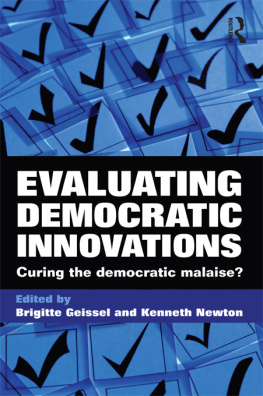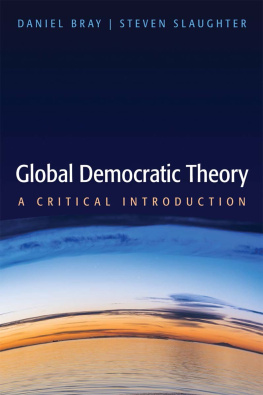Radical Proceduralism: Democracy from Philosophical Principles to Political Institutions
DANNICA FLEU
United Kingdom North America Japan India Malaysia China
Emerald Publishing Limited
Howard House, Wagon Lane, Bingley BD16 1WA, UK
First edition 2021
Copyright 2021 Dannica Fleu
Published under exclusive license by Emerald Publishing Limited
Reprints and permissions service
Contact:
No part of this book may be reproduced, stored in a retrieval system, transmitted in any form or by any means electronic, mechanical, photocopying, recording or otherwise without either the prior written permission of the publisher or a licence permitting restricted copying issued in the UK by The Copyright Licensing Agency and in the USA by The Copyright Clearance Center. Any opinions expressed in the chapters are those of the authors. Whilst Emerald makes every effort to ensure the quality and accuracy of its content, Emerald makes no representation implied or otherwise, as to the chapters' suitability and application and disclaims any warranties, express or implied, to their use.
British Library Cataloguing in Publication Data
A catalogue record for this book is available from the British Library
ISBN: 978-1-80043-721-0 (Print)
ISBN: 978-1-80043-720-3 (Online)
ISBN: 978-1-80043-722-7 (Epub)
To
Elli, Micha & Thomas You know why
(And for teaching me, very practically, that people matter more than principles.)
Table of Contents
List of Tables
| Table 5.1. | Radical Proceduralism: Roles and Claims. |
| Table 6.1. | Overview Participatory Institutional Design (PID). |
List of Acronyms
| BFN | Habermas, J. (1996). Between fact and norms. Contributions to a discourse theory of law and democracy. Polity. |
| IPR | Rawls, J. (1997). The idea of public reason revisited. The University of Chicago Law Review, 64(3), 765807. |
| JA | Habermas, J. (1993). Justification and application: Remarks on discourse ethics. Polity. |
| JaF | Rawls, J. (2001). Justice as fairness: A restatement. Harvard University Press. |
| KC | Rawls, J. (1980). Kantian constructivism in moral theory. The Journal of Philosophy, 77(9), 515572. |
| MCCA | Habermas, J. (1990). Moral consciousness and communicative action. MIT press. |
| OED 1996 | Hornblower, S., & Spawforth, A. (Eds.). (1996). The oxford classical dictionary (3rd ed.). Oxford University Press. |
| PL | Rawls, J. (2005). Political liberalism. Columbia University Press. |
| RH | Rawls, J. ([1995] 2005). Political liberalism: Reply to Habermas. In Political liberalism (pp. 372434). Columbia University Press. |
| TCA 1 | Habermas, J. (1984). The theory of communicative action: Volume 1: Reason and the Rationalization of Society. Polity. |
| TCA 2 | Habermas, J. (1985). The theory of communicative action. Volume 2: Lifeworld and system: A critique of functionalist reason. Cambridge: Polity. |
| ToJ | Rawls, J. (1999). A theory of justice (rev. ed.). Harvard University Press. |
About the Author
Dannica Fleu is a Research Fellow at Helmut-Schmidt-University Hamburg and a Research Associate at the Center for Deliberative Democracy and Global Governance. She completed her PhD in 2016 at Heidelberg University and held visiting fellowships at the University of Canberra, Australia and at Westminster University, London, UK. She is currently one of the convenors of the British Political Studies Associations' Specialist Group for Participatory and Deliberative Democracy.
Acknowledgments
Books need people who read them and act on them. Yet books also need people to be written in the first place. I wouldn't have been able to write this book without the continuous support, discussions and comments from inspiring, encouraging, passionately critical colleagues at workshops, conferences, in personal conversations, and in written exchange.
I didn't keep track of all the exchanges that have been valuable in writing this book so my sincerest apologies in advance to everybody who feels left out in this list. I'd particularly like to thank people commenting on the book in (digital and analogue) workshops, in written and oral form, and who supported me throughout the project. These are Hans Asenbaum (Canberra), Andr Bchtiger (Stuttgart), Andreas Busen (Hamburg), Sonia Bussu (Manchester), Nicole Curato (Canberra), Rod Dacombe (London), John Dryzek (Canberra), Selen Ercan (Canberra), Jean-Paul Gagnon (Canberra), Michael Haus (Heidelberg), Simon Niemeyer (Canberra), John Parkinson (Maastricht), Olivier Ruchet (Zrich), Gary S. Schaal (Hamburg), William Smith (Hong Kong), and Ulrich Thiele (Heidelberg).
I hugely benefited from my research stays at the Center for Deliberative Democracy and Global Governance in Canberra, Australia in 2018 and 2020 and at the Center for the Study of the Democracy at Westminster University in London, UK, in 2019. Many thanks to John Dryzek and Graham Smith for inviting me and giving me the opportunity to discuss democratic theory and practice in these inspiring environments and many thanks to all the amazing researchers who spontaneously included me in their work environments, lively debates, bouldering and hiking activities.
My thanks goes to Gary S. Schaal who gave me the time and space to write this book and to space out of my administrative tasks from time to time to finish the manuscript. Many thanks for supporting and challenging me since 2016 and for making humor and irony a core principle of our communicative interactions.
Michael Haus supervised the PhD project at Heidelberg University from 2012 to 2016 that parts of this book are based on. Michael, many thanks for your encouragement and support and for providing me with invitations to Heidelberg to continue our discussions of what happened afterward. I am very glad that we are keeping the conversation going across cities, sometimes across continents, and frequently across (meta-)normative divides. Your input and our controversies have been (and still are) invaluable. Also, thank you for the most hands-on advice for doing political theory as an academic profession that I received (so far): Dannica, some things are really not about theory. They're just about football.
I would also like to thank my students in Heidelberg and Hamburg who ask the best questions and who (luckily!) keep asking me to explain theory (and myself) properly. My thoughts reach out to the students in Tanzania who engaged me in lively debates about women's rights during my guest lectures in 2018 at the University of Dar es Salaam and who specifically challenged me to (re-)consider the roles and stances that I can(not) take as a philosopher, political theorist, and democratic citizen.


